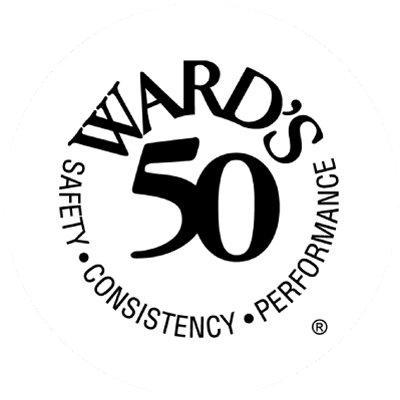Camping is a fun way to get family and friends together to enjoy the outdoors. Follow these tips to help ensure your camping trip is safe and healthy.
Get vaccinated.
Vaccinations can help protect against certain diseases and conditions while camping. Check with your doctor or nurse to see if you’ve had all of the recommended vaccines. He or she may recommend tetanus, pertussis (whooping cough), meningitis, and/or hepatitis A, depending on your medical history, destination, and other factors.
Prepare safe food and water.
Bring safe and healthy foods along on your camping trip. Eating contaminated food and drinking contaminated water can increase the risk of developing certain infectious diseases caused by germs.
Follow these steps to keep your food and water safe:
- Pack foods in tight, waterproof bags or containers. Keep them in an insulated cooler.
- Wash hands and surfaces often. Use hand sanitizer if water is not available.
- Separate raw foods from cooked foods.
- Cook foods to proper temperatures (for instance, ground beef should be cooked to an internal temperature of at least 160 degrees).
- Chill foods promptly.
- A Guide to Drinking Water Treatment and Sanitation for Backcountry & Travel Use
Include safe physical activities.
Camping is a great way to get physical activity. Do things such as walking, hiking, biking, or swimming to stay active during your camping trip. Be sure to bring protective gear, such as helmets, sturdy shoes, and life jackets. Avoid poisonous plants, like poison ivy, poison oak, and poison sumac. Know your limits, and take steps to avoid injury during activities. Never hike or swim alone. Watch kids closely. Adults should get at least 2½ hours a week and kids should get at least 1 hour a day of physical activity.
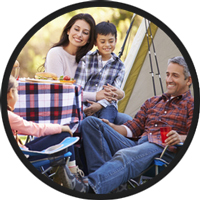 Protect against carbon monoxide poisoning.
Protect against carbon monoxide poisoning.
Carbon monoxide is odorless and colorless and can cause illness or death in people and pets. Never use fuel-burning equipment such as gas stoves, heaters, lanterns, and charcoal grills inside a tent, camper, or other enclosed shelter. It can cause dangerous levels of carbon monoxide to build up.
As alternative heat sources to fuel-burning appliances inside an enclosed shelter, campers should bring adequate bedding and clothing and should consume extra calories and fluids during the outing to prevent hypothermia (a dangerous loss of body warmth that can cause death).
Avoid wild animals, and protect family pets.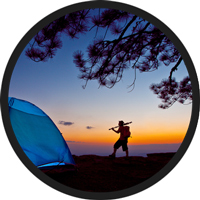
Some wild animals carry diseases that are dangerous to people. Avoid touching, feeding, and getting near wild animals. Enjoy watching them from a safe distance in their natural surroundings. Keep foods stored in sealed containers and out of the reach of animals. Make sure your family pets are vaccinated and always keep a close eye on them. Check for ticks, and remove them promptly. Make sure pets have plenty of water, food, and shelter.
- Diseases from Wildlife
- Healthy Pets, Healthy People
- Questions and Answers about Rabies, Bats, and Summer Camps
Fight the bug bite.
Mosquitoes, ticks, and other insects can cause certain diseases. To help fight the bite, apply insect repellent containing DEET to exposed skin. Be sure to follow directions on the package. Check for ticks daily, and remove them promptly. Wear long sleeves, pants, and other light-colored clothing to help prevent and spot ticks more easily.
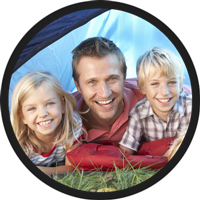
Prevent temperature-related illness.
To help prevent heat-related illness during hot days, drink plenty of alcohol-free and sugar-free fluids. Don’t wait until you’re thirsty to drink. Wear layers of light-weight, light-colored, and loose-fitting clothing. Rest often in shady areas. Protect yourself from too much sun.
Protect yourself from the sun.
Protection from ultraviolet (UV) radiation is important all year. UV rays from the sun can reach you on cloudy and hazy days, as well as bright and sunny days. Use a broad-spectrum (against UVA and UVB rays) sunscreen and lip balm with at least SPF 15. Seek shade, especially during midday hours, when the sun’s rays are strongest. Cover up with clothing, a wide-brimmed hat, and sunglasses.
Avoid water-related illness and injury.
Camping often includes playing in and around the water. To help protect yourself and your fellow campers from illness, don’t swim if you have diarrhea, and don’t swallow the water you swim in. Take a shower before and after swimming. Never swim alone. If you plan to ride in a boat, canoe, or other water vehicles, be sure to wear a life jacket.
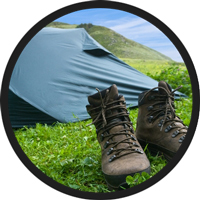
Be prepared.
Always prepare for the unexpected. Before you leave, check the weather report, learn about security at your camp location, and tell family and friends your plans. Know what to do when toilets are not available. Be sure to bring along a supply kit that includes a first-aid kit, compass or GPS, map, flashlight, blankets, batteries, food, water, clothes, and medications. Know who to contact at the camp to report issues that may come up. When you return home, check for ticks, skin rashes or sunburn, dehydration, and other problems.
- Gather Emergency Supplies
- Prepare for Unpredictable Spring Weather
- Your Survival Guide to Safe and Healthy Travel
- Travel Advisories: Outdoor Safety (USDA Forest Service)
The above excerpt has been adapted from, “Camping Health and Safety Tips.” For more information please visit https://www.cdc.gov.


